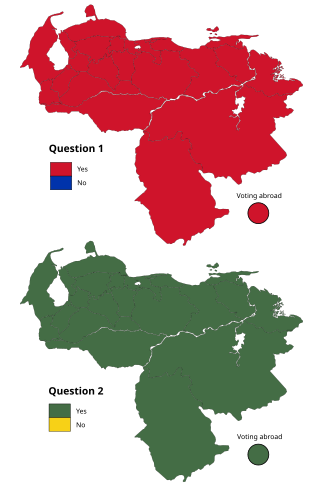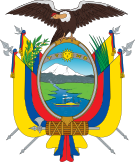The History of Ecuador covers human habitation in the region reaching back 8,000 years.

The politics of Ecuador are multi-party. The central government polity is a quadrennially elected presidential, unicameral representative democracy. The President of Ecuador is head of state and head of the army on a multi-party system, and leads a cabinet with further executive power. Legislative power is not limited to the National Assembly, as it may to a lesser degree be exercised by the executive which consists of the President convening an appointed executive cabinet. Subsequent acts of the National Assembly are supreme over Executive Orders where sufficient votes have been cast by the legislators. The judiciary is independent of the executive and the legislature. Ecuador is also considered a constitutional republic.
This electoral calendar 2007 lists the national/federal direct elections held in 2007 in the de jure and de facto sovereign states and their dependent territories. Referendums are included, although they are not elections. By-elections are not included.

Rafael Vicente Correa Delgado is an Ecuadorian politician and economist who served as President of Ecuador from 2007 to 2017. The leader of the PAIS Alliance political movement from its foundation until 2017, Correa is a democratic socialist and his administration focused on the implementation of left-wing policies. Internationally, he served as president pro tempore of the UNASUR.

Cynthia Fernanda Viteri Jiménez de Váscones is an Ecuadorian lawyer, journalist and politician. On March 24, 2019, she was elected Mayor of Guayaquil, the second-largest city in Ecuador, in the sectional elections of Ecuador for a term from May 14, 2019 until May 14, 2023. She was the presidential candidate for Partido Social Cristiano in the 2017 presidential elections, and was a candidate in the 2006 presidential elections of Ecuador and finished fifth. Between 1998 and 2007 she was a member of the National Congress. In 2009 she became a member of the National Assembly.

A constitutional referendum was held in Bolivia on 25 January 2009, postponed from the initially planned dates of 4 May 2008 and then 7 December 2008. Drafted by the Constituent Assembly in 2007, the new constitution was approved in the referendum according to an exit poll by Ipsos Apoyo for La Razón and ATB, a Bolivian television network. Furthermore, it required early elections to be held on 6 December 2009.

Constituent Assembly elections were held in Ecuador on 30 September 2007. A Constituent Assembly was established following an April referendum on doing so. A total of 130 delegates were elected; 24 members from national lists, 100 elected from provincial constituencies and six for overseas votes.

A constitutional referendum was held in France on 5 May 1946. Voters were asked whether they approved of a new draft Constitution proposed by the Constituent Assembly elected in 1945.

The Revolutionary and Democratic Ethical Green Movement (MOVER, Spanish: Movimiento Verde Ético Revolucionario y Democrático) is a centre-right neoliberal and environmentalist political party in Ecuador. In 2016, it had 979,691 members. Until 2021 it was known as the PAIS Alliance (Proud and Sovereign Homeland) (PAIS, Spanish: Alianza PAIS (Patria Altiva i Soberana)).

A constitutional referendum was held in Ecuador on 28 September 2008 to ratify or reject the constitution drafted by the Ecuadorian Constituent Assembly elected in 2007. The new constitution was approved by 69% of voters.
The Ecuadorian Constituent Assembly was a 2007–2008 constitutional assembly in Ecuador, which drafted the 2008 Constitution of Ecuador, approved via the Ecuadorian constitutional referendum, 2008.

The Constitution of Ecuador is the supreme law of Ecuador. The current constitution has been in place since 2008. It is the country's 20th constitution.
Ecuador is a country in South America.

A referendum on convening a Constituent Assembly was held in Venezuela on 25 April 1999. It was promoted by President Hugo Chávez, with voters asked two questions on convening a National Constituent Assembly and how that body should be elected. Both proposals were approved by over 80% of voters.

General elections were held in Ecuador on 17 February 2013 to elect the President, the National Assembly, Provincial Assemblies and members of the Andean Parliament. The incumbent President Rafael Correa was re-elected by a wide margin. Correa's closest electoral rival, Guillermo Lasso, conceded the election shortly after it concluded.

Ricardo Armando Patiño Aroca is an Ecuadorian politician who has served as Minister of Foreign Affairs of Ecuador from 2010 until 2016, under the government of President Rafael Correa. Previously he was Minister of Finance and Minister of the Coast. He is one of the ideologists of The Citizens' Revolution who with Correa wanted to gradually introduce a democratic socialist government in Ecuador. On 4 March 2016, he was named as Defense Minister by President Correa.

General elections were held in Ecuador on 19 February 2017 alongside a referendum on tax havens. Voters elected a new President and National Assembly. Incumbent President Rafael Correa of the PAIS Alliance was not eligible for re-election, having served three terms. In the first round of the presidential elections, PAIS Alliance candidate Lenín Moreno received 39% of the vote. Although he was more than 10% ahead of his nearest rival, Guillermo Lasso of the Creating Opportunities party, Moreno was just short of the 40% threshold required to avoid a run-off. As a result, a second round was held on 2 April. In the second round Moreno was elected president with 51.16% of the vote.

This national electoral calendar for 2021 lists the national/federal elections held in 2021 in all sovereign states and their dependent territories. By-elections are excluded, though national referendums are included.

General elections were held in Ecuador on 7 February 2021, established by the National Electoral Council (CNE) as the date for the first round of the presidential election and a vote on mining in Cuenca. Incumbent president Lenín Moreno, who had held the office since his victory over Guillermo Lasso in 2017, did not seek reelection. Although delaying the election due to the COVID-19 pandemic was discussed, the CNE announced on 15 December 2020 that the electoral calendar would not shift and confirmed elections would take place in February 2021.

A constitutional referendum was held in Ecuador on 5 February 2023, alongside local elections. The binding consultation was called on 29 November 2022 by President Guillermo Lasso. Voters were asked to approve or reject a total of eight questions surrounding changes to the Constitution of Ecuador. Soon after the referendum, Reuters, Al Jazeera, CNN en Español and the Financial Times projected the failure of all eight of its proposals, with president Guillermo Lasso eventually conceding defeat. Turnout for the referendum was estimated at 80.74%.













